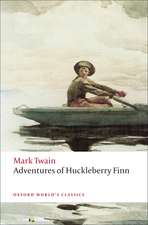The Adventures of Tom Sawyer
Autor Mark Twain Ilustrat de T. Williamsen Limba Engleză Paperback
Vezi toate premiile Carte premiată
Preț: 91.23 lei
Nou
17.46€ • 19.02$ • 14.71£
Carte tipărită la comandă
Livrare economică 23 aprilie-07 mai
Specificații
ISBN-10: 1456406221
Pagini: 176
Dimensiuni: 178 x 254 x 10 mm
Greutate: 0.32 kg
Editura: CreateSpace Independent Publishing Platform
Extras
"Tom!"
No answer.
"Tom!"
No answer.
"What's gone with that boy, I wonder? You TOM!"
No answer.
The old lady pulled her spectacles down and looked over them, about the room; then she put them up and looked out under them. She seldom or never looked through them for so small a thing as a boy; they were her state pair, the pride of her heart, and were built for "style," not service;-she could have seen through a pair of stove lids just as well. She looked perplexed for a moment, and then said, not fiercely, but still loud enough for the furniture to hear:
"Well, I lay if I get hold of you I'll-"
She did not finish, for by this time she was bending down and punching under the bed with the broom-and so she needed breath to punctuate the punches with. She resurrected nothing but the cat.
"I never did see the beat of that boy!"
She went to the open door and stood in it and looked out among the tomato vines and "jimpson" weeds that constituted the garden. No Tom. So she lifted up her voice, at an angle calculated for distance, and shouted:
"Y-o-u-u Tom!"
There was a slight noise behind her and she turned just in time to seize a small boy by the slack of his roundabout and arrest his flight.
"There! I might 'a' thought of that closet. What you been doing in there?"
"Nothing."
"Nothing! Look at your hands. And look at your mouth. What is that truck?"
"I don't know, aunt."
"Well I know. It's jam-that's what it is. Forty times I've said if you didn't let that jam alone I'd skin you. Hand me that switch."
The switch hovered in the air-the peril was desperate-
"My! Look behind you, aunt!"
The old lady whirled around, and snatched her skirts out of danger. The lad fled, on the instant, scrambled up the high board fence, and disappeared over it.
His aunt Polly stood surprised a moment, and then broke into a gentle laugh.
"Hang the boy, can't I never learn anything? Ain't he played me tricks enough like that for me to be looking out for him
by this time? But old fools is
the biggest fools there is. Can't learn an old dog new tricks, as the saying is. But my goodness, he never plays them alike, two days, and how is a body to know what's coming? He 'pears to know just how long he can torment me before I get my dander up, and he knows if he can make out to put me off for a minute or make me laugh, it's all down again and I can't hit him a lick. I ain't doing my duty by that boy, and that's the Lord's truth, goodness knows. Spare the rod and spile the child, as the Good Book says. I'm a-laying up sin and suffering for us both, I know. He's full of the Old Scratch, but laws-a-me! he's my own dead sister's boy, poor thing, and I ain't got the heart to lash him, somehow. Every time I let him off my conscience does hurt me so, and every time I hit him my old heart most breaks. Well-a-well, man that is born of woman is of few days and full of trouble, as the Scripture says, and I reckon it's so. He'll play hookey this evening,* and I'll just be obleeged to make him work, to-morrow, to punish him. It's mighty hard to make him work Saturdays, when all the boys is having holiday, but he hates work more than he hates anything else, and I've got to do some of my duty by him, or I'll be the ruination of the child."
Tom did play hookey, and he had a very good time. He got back home barely in season to help Jim, the small colored boy, saw next day's wood and split the kindlings, before supper-at least he was there in time to tell his adventures to Jim while Jim did three-fourths of the work. Tom's younger brother, (or rather, half-brother) Sid, was already through with his part of the work (picking up chips,) for he was a quiet boy and had no adventurous, troublesome ways.
While Tom was eating his supper, and stealing sugar as opportunity offered, aunt Polly asked him questions that were full of guile, and very deep-for she wanted to trap him into damaging revealments. Like many other simple-hearted souls, it was her pet vanity to believe she was endowed with a talent for dark and mysterious diplomacy and she loved to contemplate her most transparent devices as marvels of low cunning. Said she:
"Tom, it was middling warm in school, warn't it?"
"Yes'm."
"Powerful warm, warn't it?"
"Yes'm."
"Didn't you want to go in a-swimming, Tom?"
A bit of a scare shot through Tom-a touch of uncomfortable suspicion. He searched aunt Polly's face, but it told him nothing. So he said:
"No'm-well, not very much."
The old lady reached out her hand and felt Tom's shirt, and said:
"But you ain't too warm now, though." And it flattered her to reflect that she had discovered that the shirt was dry without anybody knowing that that was what she had in her mind. But in spite of her, Tom knew where the wind lay, now. So he forestalled what might be the next move:
"Some of us pumped on our heads-mine's damp yet. See?"
Aunt Polly was vexed to think she had overlooked that bit of circumstantial evidence, and missed a trick. Then she had a new inspiration:
"Tom, you didn't have to undo your shirt collar where I sewed it to pump on your head, did you? Unbutton your jacket!"
The trouble vanished out of Tom's face. He opened his jacket. His shirt collar was securely sewed.
"Bother! Well, go 'long with you. I'd made sure you'd played hookey and been a-swimming. But I forgive ye, Tom. I reckon you're a kind of a singed cat, as the saying is-better'n you look. This time."
She was half sorry her sagacity had miscarried, and half glad that Tom had stumbled into obedient conduct for once.
But Sidney said:
"Well, now, if I didn't think you sewed his collar with white thread, but it's black."
"Why, I did sew it with white! Tom!"
But Tom did not wait for the rest. As he went out at the door he said:
"Siddy, I'll lick you for that."
In a safe place Tom examined two large needles which were thrust into the lappels of his jacket, and had thread bound about them-one needle carried white thread and the other black. He said:
"She'd never noticed, if it hadn't been for Sid. Consound it! sometimes she sews it with white and sometimes she sews it with black. I wish to geeminy she'd stick to one or t'other-I can't keep the run of 'em. But I bet you I'll lam Sid for that. I'll learn him!"
He was not the Model Boy of the village. He knew the model boy very well though-and loathed him.
Within two minutes, or even less, he had forgotten all his troubles. Not because his troubles were one whit less heavy and bitter to him than a man's are to a man, but because a new and powerful interest bore them down and drove them out of his mind for the time-just as men's misfortunes are forgotten in the excitement of new enterprises. This new interest was a valued novelty in whistling, which he had just acquired from a negro, and he was suffering to practice it undisturbed. It consisted in a peculiar bird-like turn, a sort of liquid warble, produced by touching the tongue to the roof of the mouth at short intervals in the midst of the music-the reader probably remembers how to do it if he has ever been a boy. Diligence and attention soon gave him the knack of it, and he strode down the street with his mouth full of harmony and his soul full of gratitude. He felt much as an astronomer feels who has discovered a new planet. No doubt, as far as strong, deep, unalloyed pleasure is concerned, the advantage was with the boy, not the astronomer.
The summer evenings were long. It was not dark, yet. Presently Tom checked his whistle. A stranger was before him-a boy a shade larger than himself. A new-comer of any age or either sex was an impressive curiosity in the poor little shabby village of St. Petersburg. This boy was well dressed, too-well dressed on a week-day. This was simply astounding. His cap was a dainty thing, his close-buttoned blue cloth roundabout was new and natty, and so were his pantaloons. He had shoes on-and yet it was only Friday. He even wore a necktie, a bright bit of ribbon. He had a citified air about him that ate into Tom's vitals. The more Tom stared at the splendid marvel, the higher he turned up his nose at his finery and the shabbier and shabbier his own outfit seemed to him to grow. Neither boy spoke. If one moved, the other moved-but only sidewise, in a circle; they kept face to face and eye to eye all the time. Finally Tom said:
"I can lick you!"
"I'd like to see you try it."
"Well, I can do it."
"No you can't, either."
"Yes I can."
"No you can't."
"I can."
"You can't."
"Can!"
"Can't!"
An uncomfortable pause. Then Tom said:
"What's your name?"
"Tisn't any of your business, maybe."
"Well I 'low I'll make it my business."
"Well why don't you?"
"If you say much I will."
"Much-much-much! There now."
"Oh, you think you're mighty smart, don't you? I could lick you with one hand tied behind me, if I wanted to."
"Well why don't you do it? You say you can do it."
"Well I will, if you fool with me."
"Oh yes-I've seen whole families in the same fix."
"Smarty! You think you're some, now, don't you? Oh what a hat!"
"You can lump that hat if you don't like it. I dare you to knock it off-and anybody that'll take a dare will suck eggs."
"You're a liar!"
"You're another."
"You're a fighting liar and dasn't take it up."
"Aw-take a walk!"
"Say-if you gimme much more of your sass I'll take and bounce a rock off'n your head."
"Oh, of course you will."
"Well I will."
"Well why don't you do it then? What do you keep saying you will, for? Why don't you do it? It's because you're afraid."
"I ain't afraid."
"You are."
"I ain't."
"You are."
Another pause, and more eyeing and sidling around each other. Presently they were shoulder to shoulder. Tom said:
"Get away from here!"
"Get away yourself!"
"I won't."
"I won't either."
So they stood, each with a foot placed at an angle as a brace, and both shoving with might and main, and glowering at each other with hate. But neither could get an advantage. After struggling till both were hot and flushed, each relaxed his strain with watchful caution, and Tom said:
"You're a coward and a pup. I'll tell my big brother on you, and he can thrash you with his little finger, and I'll make him do it, too."
"What do I care for your big brother? I've got a brother that's bigger than he is-and what's more, he can throw him over that fence, too." [Both brothers were imaginary.]
"That's a lie."
"Your saying so don't make it so."
Tom drew a line in the dust with his big toe, and said:
"I dare you to step over that, and I'll lick you till you can't stand up. Anybody that'll take a dare will steal a sheep."
The new boy stepped over promptly, and said:
"Now you said you'd do it, now let's see you do it."
"Don't you crowd me, now; you better look out."
"Well you said you'd do it-why don't you do it?"
"By jingo! for two cents I will do it."
The new boy took two broad coppers out of his pocket and held them out with derision. Tom struck them to the ground. In an instant both boys were rolling and tumbling in the dirt, gripped together like cats; and for the space of a minute they tugged and tore at each other's hair and clothes, punched and scratched each other's noses, and covered themselves with dust and glory. Presently the confusion took form, and through the fog of battle Tom appeared, seated astride the new boy and pounding him with his fists.
"Holler 'nuff!" said he.
The boy only struggled to free himself. He was crying,-mainly from rage.
"Holler 'nuff!"-and the pounding went on.
At last the stranger got out a smothered "'Nuff!" and Tom let him up and said:
"Now that'll learn you. Better look out who you're fooling with, next time."
The new boy went off brushing the dust from his clothes, sobbing, snuffling, and occasionally looking back and shaking his head and threatening what he would do to Tom the "next time he caught him out." To which Tom responded with jeers, and started off in high feather; and as soon as his back was turned the new boy snatched up a stone, threw it and hit him between the shoulders and then turned tail and ran like an antelope. Tom chased the traitor home, and thus found out where he lived. He then held a position at the gate for some time, daring the enemy to come outside, but the enemy only made faces at him through the window and declined. At last the enemy's mother
appeared, and called Tom a bad, vicious, vulgar child, and ordered him away. So he went away; but he said he "lowed" to "lay" for that boy.
He got home pretty late, that night, and when he climbed cautiously in at the window, he uncovered an ambuscade, in the person of his aunt; and when she saw the state his clothes were in her resolution to turn his Saturday holiday into captivity at hard labor became adamantine in its firmness.
From the Trade Paperback edition.
Recenzii
There comes a time in every boy's life when when he has a raging desire to go somewhere and dig for hidden treasure'. Impish, daring young Tom Sawyer is a hero to his friends and a torment to his relations. For wherever there is mischief or adventure, Tom is at the heart of it. During one hot summer, Tom witnesses a murder, runs away to be a pirate, attends his own funeral, rescues an innocent man from the gallows, searches for treasure in a haunted house, foils a devilish plot and discovers a box of gold. But can he escape his nemesis, the villainous Injun Joe? BACKSTORY: Find out some fascinating facts about the author and have a go at a game of marbles!
- "This classic story will stay with you through life, and always remind you of the things that you knew were important when you first read it." --"Independent"
This classic story will stay with you through life, and always remind you of the things that you knew were important when you first read it Independent Whet juvenile appetites with Tom, his entrepreneurial spirit and his taste for treasure-hunting adventure. A paean to true boyhood Guardian The language is hard to begin with but the hero is one of the most endearing in literature -- Michael Morpurgo Daily Telegraph Twain had a gift for reliving the innermost feelings of growing up, the insecurity, fears and hopes that lie beneath the swagger that young boys maintain. He turned them into literature Daily Mail
Notă biografică
Twain war das sechste Kind in einer Familie aus schlechten sozialen Verhältnissen. Seine Zeit am Mississippi diente später als Inspiration für "Huckleberry Finn". Als Twain elf Jahre alt war, starb sein Vater. Schon früh ließ er sich zum Schriftsetzer ausbilden. Nachdem sein Bruder die Lokalzeitung aufgekauft hatte, konnte Twain dort erste Artikel veröffentlichen.
Nach Reisen durch die USA arbeitete Twain bis zum Ausbrauch des Bürgerkriegs 1861 als Lotse auf einem Mississippidampfer. Er kämpfte zwei Wochen für die Südstaaten, setzte sich aber ab und ging zu den Goldgräbern nach Virginia, wo er als Reporter von Klatschgeschichten zwar Ruhm erlangte, jedoch fliehen musste.
1863 nutzte er erstmals sein Pseudonym "Mark Twain". Er wurde damit berühmt und konnte seinen Lebensunterhalt mit seinen Werken verdienen. 1870 heiratete er. Mit seiner Frau bekam er vier Kinder, von denen das erste jedoch nach zwei Jahren starb. Er schrieb seine bekanntesten Werke, darunter 1884 "The Adventures of Huckleberry Finn".Twains Satire war so bissig, dass die Jugendbuchausgaben seiner Werke oftmals entschärft wurden.
Ab 1891 lebte Twain einige Jahre in Europa, unter anderem im Berlin, wo er seine Töchter auf die Schule schickte, und in Wien. Er war auch als Geschäftsmann zumeist erfolgreich tätig bis auf die Insolvenz seines Verlages. 1894 starb eine seiner Töchter, 1904 seine Frau und 1908 eine weitere Tochter. Diese Verluste schlugen sich in seinen Werken als pessimistische Grundstimmung nieder.
Mark Twain starb 1910 als hoch geachteter Autor im Alter von 74 Jahren in Connecticut.
Textul de pe ultima copertă
Cuprins
Introduction
Literary Allusions and Notes
Critical Excerpts
Mark Twain on The Adventures of Tom Sawyer
Suggestions for Further Reading
Descriere
'Tom was a glittering hero once more - the pet of the old, and the envy of the young...There were some that believed he would be President yet, if he escaped hanging.'In this enduring and internationally popular novel, Mark ogaincombines social satire and dime-novel sensation with a rhapsody on boyhood and on America's pre-industrial past. Tom Sawyer is resilient, enterprising, and vainglorious. In a series of adventures along the banks of the Mississippi, he usually manages to come out on top. From petty triumphs over his friends and over his long-suffering Aunt Polly, to his intervention in a murder trial, Tom engages readers of all ages. He has longbeen a defining figure in the American cultural imagination.Alongside the charm and the excitement, Twain raises serious questions about community, race, and the past. Above all, the book invites discussion of the way in which childhood is invoked to counter the uncomfortable truths of the adult world. ABOUT THE SERIES: For over 100 years Oxford World's Classics has made available the widest range of literature from around the globe. Each affordable volume reflects Oxford's commitment to scholarship, providing the most accurate text plus a wealth of other valuable features, including expert introductions by leading authorities, helpful notes to clarify the text, up-to-date bibliographies for further study, and much more.
Premii
- Audies Finalist, 2009

















